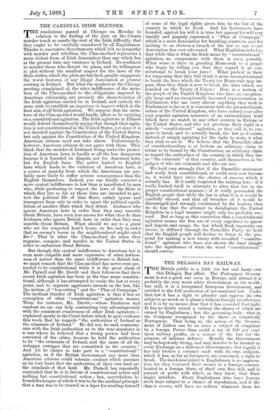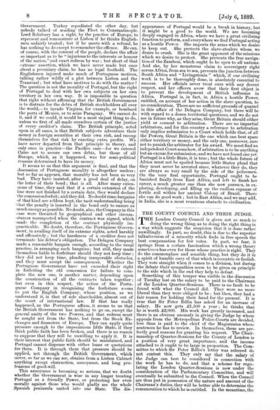THE DELAGOA BAY RAILWAY. T HE British public is a little
too hot and hasty over this Delagoa Bay affair. The Portuguese Govern- ment is not a good one even in Europe, and abroad it is probably the very worst white Government in the world ; but still,- it is a recognised European Government, and entitled to the full protection of international law. Under that law it has a right to plunder and oppress its own subjects as much as it pleases without foreign interference, and it is by no means clear that it has exceeded that right. It has no doubt seized a railway the shares of which are owned by Englishmen ; but the governing body—that is, the Company recognised by the State—is admittedly Portuguese. That being so, the action of the Govern- ment of Lisbon can be no more a subject of complaint by a foreign Power than could a tax of 100 per cent upon railway profits, or a seizure of the line for the purpose 'of military defence. Morally the Government may be hopelessly wrong, and may deserve to be treated on every Exchange as a dishonest Government ; but legally it has only broken a contract made with its own subjects, which it has, as far as foreigners are concerned, a right to break. The incidental injury to Englishmen is no aggrava- tion, for they ventured their money in a foreign concern, located in a foreign State, of their own free will, and in pursuit of profit with which, as they knew, that State might interfere. Every Englishman who buys foreign stock buys subject to a chance of repudiation, and if the chance occurs, will have no redress whatever from his Government. Turkey repudiated the other day, but nobody talked of sending the Fleet to Constantinople. Lord Salisbury has a right, by the practice of Europe, to represent and remonstrate at Lisbon if he thinks English- men unfairly treated ; but if he meets with a refusal, he has nothing to do except to remember the offence. He can, of course, with the consent of the people, declare the affair so important as to be "injurious to the interests or honour of the nation," and exact redress by war ; but short of that extreme assertion, which we have never made but once about a pecuniary claim, he has no legal foothold. The Englishmen injured make much of Portuguese motives, talking rather wildly of a plot between Lisbon and the Transvaal ; but what have motives to do with the matter ?
The question is not the morality of Portugal, but the right of Portugal to deal with her own subjects on her own territory in her own way. It is impossible to question that right without affirming that the British Government is to distrain for the debts of British stockholders all over the world,—to invade Virginia, for example, or bombard the ports of Mexico, or to seize Paraguay. We cannot do it, and if we could, it would be a most unjust thing to do, unless we first of all made ourselves certain of the justice of every creditor's claim. The British principle, acted upon in all cases, is that British subjects adventure their money in foreign securities at their own risk, and recoup themselves for that risk by exacting extra profits. We have never departed from that principle in theory, and only once -in practice—the Pacifico case—for we entered Cairo not to secure our own debts, but those of all Europe, which, as it happened, was for semi-political reasons determined to have its money.
It seems to Us that this argument is final, and that the discussion of Portuguese morality is altogether useless ; but so far as appears, that morality has not been so very bad. They have insisted, after a good deal of delay, on -the letter of their bond ; that is all. After many exten- sions of time, they said that if a certain extension of the line were not finished by a certain date, they would declare the concession forfeit; and they did. No doubt time-bargains of that kind are seldom kept, the tacit understanding being -that the penalty is inserted in the bond only to ensure as 'much energy as possible. No doubt, also, the Company in this case were thwarted by geographical and other circum- -stances unsuspected when the contract was signed, which -made the completion of the contract physically im- practicable. No doubt, therefore, the Portuguese Govern- ment, in availing itself of its extreme rights, acted harshly -and offensively ; but the harshness of a creditor does not terminate his debtor's obligation. The Delagoa Company • made a reasonable bargain enough, according to the usual practice, in arranging such bargains ; but still, they made themselves liable to forfeiture should they not keep time ; they did not keep time, pleading insuperable obstacles, and they must accept the consequences. Whether the Portuguese Government have not exceeded their right in forfeiting the old concession for failure to com- plete the new one, is another matter, depending upon the construction of all the contracts taken together ; but even in this respect, the action of the Portu- guese Company in recognising the forfeiture seems to put the English Company, whose position, as we -understand it, is that of sole shareholder, almost out of . the court of international law. If that has really happened, as the Portuguese affirm, it seems to us that the British Government has nothing to go on, except the general amity of the two Powers, and that redress must be sought not from the State, but from the Stock Ex- changes and financiers of Europe. They can apply quite pressure enough to the impecunious little State, if they think public faith has been broken, and there is no reason to suppose that they will be unwilling to apply it. It is -their interest that public faith should be maintained, and Portugal cannot dispense with either loans or quotations for them. It is through them that pressure should be applied, not through the British Government, which sever, so far as we can see, obtains from a Lisbon Cabinet anything except obstruction, annoyance, and long pro- fessions of good-will.
This annoyance is becoming so serious, that we doubt whether the Government is wise in any longer treating Portugal as a friendly Power, or protecting her even morally against those who would gladly see the whole Spanish peninsula united into one State. The dis- appearance of Portugal would be a break in history, but it might be a good to the world. We are becoming deeply engaged in Africa, where we have a great civilising function to perform, and everywhere we find Portugal acting as a hostile Power. She imports the arms which we desire to keep out. She protects the slave-stealers whom we desire to crush. She is the great opponent of the missions which we desire to protect. She prevents the free naviga- tion of the Zambesi, which ought to be open to all nations. And she, by her monstrous claim to sovereignty right across Africa, from sea to sea, prevents the junction between South Africa and " Livingstonia " which, if our civilising work is to be thoroughly done, is absolutely essential to success. Her officials never treat ours with any decent respect, and her officers avow that their first object is to prevent the development of British influence in Africa. Portugal is, in fact, in Africa a hostile Power, entitled, on account of her action in the slave question, to no consideration. There are no sufficient grounds of quarrel in this affair of the Delagoa Company, but there will be with regard to a dozen territorial questions, and we do not see in future why, as they arise, Great Britain should either yield or consent to arbitration. There are no impartial arbitrators, and for this country a reference to arbitration only implies submission to a Court which holds that, of all the Powers, Great Britain is the one which can best spare either territory or money, and the only one, moreover, sure not to punish the arbitrator for his award. We must find an independent Court somehow, if arbitration is to be anything but an excuse for submission; and we have not found one yet. Portugal is a little State, it is true ; but the whole future of Africa must not be spoiled because little States plead that they must never be arrested since, whatever they do, they are always so very small by the side of the policemen. On the very first opportunity, Portugal ought to be banished finally from East Africa, and left to finish her career, a much greater one than she now pursues, in ex- ploring, developing, and filling up the endless expanse of fertile soil within her ancient Colony of Brazil. There she can do good work ; but in East Africa, and we may add, in India, she is a most vexatious obstacle to civilisation.











































 Previous page
Previous page